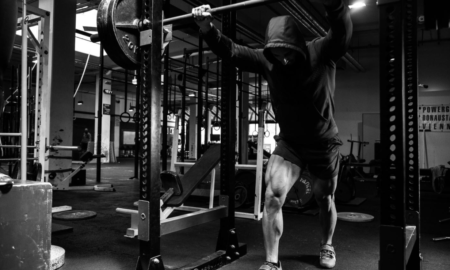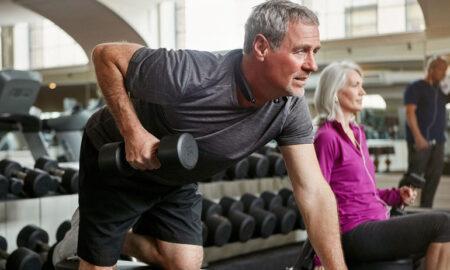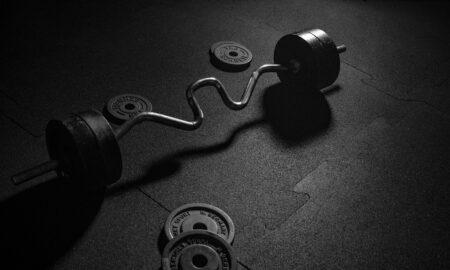An apple a day keeps the doctor away. Forget the apple; bring me a plate of raw salmon. If there's a single bodybuilding food that's superior to others (move aside, whey, casein and all others vying for the title), it's got to be fish. Why? you ask. Two reasons: It's an excellent protein source, containing all of the essential amino acids, and the fat found in fish (the omega-3 fatty acids) is head and shoulders above all other fats when it comes to a whole slew of benefits, including inhibiting tumor growth and reducing risk of cardiovascular disease. Furthermore, scientists have found that eating oily fish like salmon, tuna or bluefish can block dangerous irregular heart rhythm. But I'm sure cardiac arrythmia is the last thing on the minds of young studs banging weights in the gym.
Gaining muscle, as you well know, is a matter of protein synthesis exceeding protein degradation. Certain proteins, such as whey, promote elevations in protein synthesis; on the other hand, casein is an excellent anticatabolic protein and inhibits protein degradation. Fish fat, specifically eicosapentanoic acid (EPA), has been shown in several animal studies to 'downregulate ubiquitin-dependent proteolysis' associated with muscle wasting, or muscle-protein catabolism. Translation: Taking in EPA has an anticatabolic effect.
Similar effects in humans have been seen at reasonable dosages of EPA. For instance, a study recently examined 20 patients with pancreatic cancer who were losing significant amounts of bodyweight. They took a nutritional supplement providing 600 kilocalories and 2 grams of eicosapentanoic acid per day, and after three weeks there was a significant increase in serum insulin concentration, a fall in the cortisol-to-insulin ratio and decreases in factors related to proteolysis. The investigators believed these changes were related to the 1 kilogram weight gain seen in these patients. Clearly, the rise in insulin assists the anabolic processes, as does the drop in cortisol-to-insulin ratio. A two-gram dose of EPA could likely be covered by six to 10 ounces of raw salmon; you could get that amount from fish-oil supplements as well. Another food source of omega-3s is flaxseed oil.
Bottom line: Either take your fish-oil capsules or visit the sushi bar on a regular basis.
Somethin' fishy goin' on. Keep in mind that different proteins exert different physiological effects. Cod protein, for instance, has effects unlike soy or casein. You're probably familiar with cod (as in cod liver oil), but nutrients in that cold-water fish function in an intriguing way, according to emerging research. In one study, three groups of rats ate a high-fat diet in which the protein source was casein, cod or soy. Those rats were compared to a control group that ate regular rat chow. High-fat feeding led to severe whole-body and skeletal-muscle insulin resistance in casein- or soy protein-fed rats; however, cod protein prevented the development of insulin resistance. In essence, the cod-fed rats could dispose of glucose with much less insulin than casein- or soy-fed rats. Interestingly, the benefits of cod weren't related to any changes in bodyweight or fat mass'meaning there's something unique about the peptides or protein in cod that accounts for greater rates of insulin-stimulated glucose uptake. Something special about fish proteins makes them superior to milk-based or soy proteins. If I had to choose between chicken breasts or fish (cod, salmon, tuna), I'd go fish.
The leucine signal. Leucine by itself, at levels found after eating a meal, plays a critical role in regulating muscle-protein synthesis. What's fascinating is that a single leucine-supplemented meal may in fact be sufficient to stimulate muscle-protein synthesis for a period of several days. Work published in the Journal of Nutrition examined whether the acute consumption of leucine feeding persisted over a 10-day period. Researchers fed adult (nine months) and old (21 months) rats either an alanine- or leucine-supplemented diet once daily for one hour and then made the standard rat chow available for seven hours. The leucine meal caused a 100 percent increase in plasma leucine concentration relative to normal postmeal levels. To prevent blood levels of the branched-chain aminos valine and isoleucine from falling, those amino acids were also added.
This investigation showed that a leucine-supplemented meal helped restore postprandial (after eating) muscle-protein synthesis in old rats, thus confirming the results of previous studies. In adult rats chronic daily supplementation with leucine also improved the postabsorptive muscle-protein synthesis. The researchers speculated that leucine supplementation may be one way to obtain gains in protein without having to engage in high-protein feeding. Alternatively, I think it might be worthwhile to add leucine to a postworkout meal so as to further enhance the anabolic effect.
Polylysine inhibits fat absorption. Polylysine is a peptide, or short protein, that was originally isolated from the culture broth of Streptomyces albulus (a strain of bacteria) and has been used as a food preservative for more than 10 years in Japan. Not only does polylysine have antimicrobial and antiviral properties, but it may also have an impact on fat metabolism. Here's how.
Japanese scientists doing preliminary work on polylysine discovered that it suppressed dietary-fat absorption from the small intestine of rats by inhibiting pancreatic lipase activity. Now we need a human-subject study to see whether similar effects also occur in the human body.
References
Barber, M.D., et al. (2001). Effect of a fish oil-enriched nutritional supplement on metabolic mediators in patients with pancreatic cancer cachexia. Nutr Cancer. 40(2):118-24.
Whitehouse, A.S., et al. (2001). Mechanism of attenuation of skeletal muscle protein catabolism in cancer cachexia by eicosapentanoic acid. Cancer Res. 61:3604-3609.
Lavigne, C. et al. (2001). Prevention of skeletal muscle insulin resistance by dietary cod protein in high fat-fed rats. Am J Physiol Endocrinol Metab. 281(1):E62-71.
Rieu, I., et al. (2003). Leucine-supplemented meal feeding for 10 days beneficially affects postprandial muscle protein synthesis in old rats. J Nutr. 133:1198-1205.
Kido, Y., et al. (2003). Epsilon-polylysine inhibits pancreatic lipase activity and suppresses postprandial hypertriacylglyceridemia in rats. J Nutr. 133:1887-1891.
Editor's note: Jose Antonio, Ph.D., CSCS, earned his doctorate at the University of Texas Southwestern Medical Center. He is a co-editor (with Jeffrey R. Stout, Ph.D.) of and contributor to Sports Supplements (Lippincott Williams & Wilkins), Sports Supplement Encyclopedia (Nutricia), Supplements for Strength-Power Athletes (Human Kinetics) and Supplements for Endurance Athletes (Human Kinetics). For more information visit www.supplementbooks.com. IM




















You must be logged in to post a comment Login